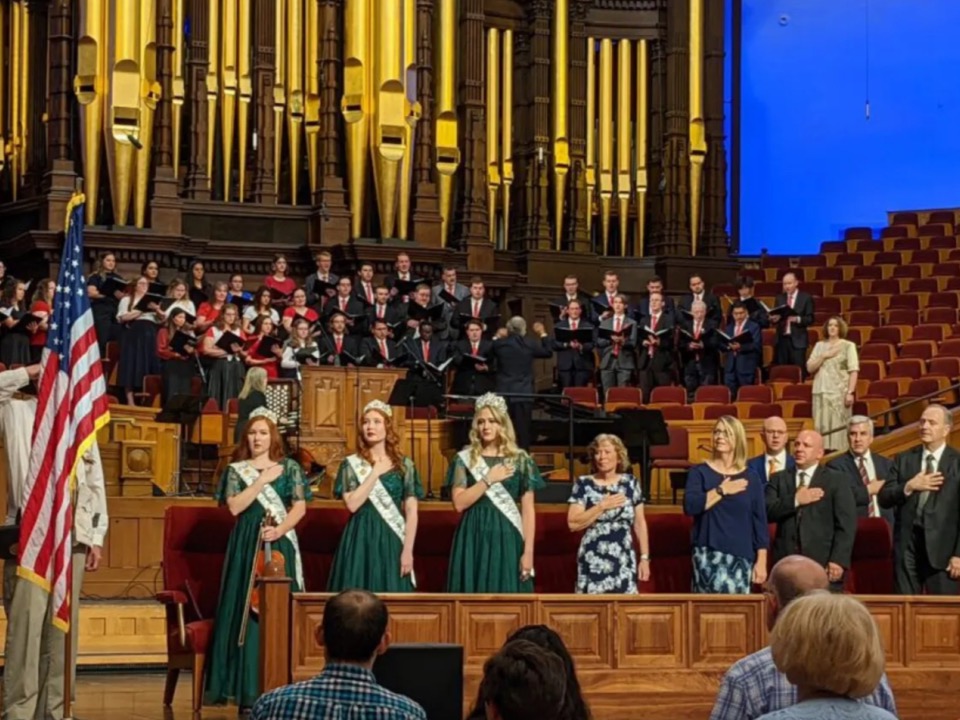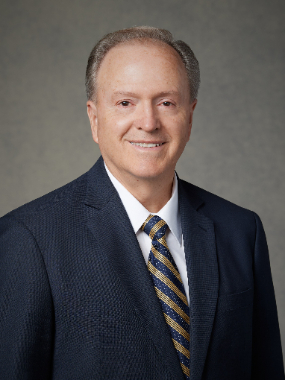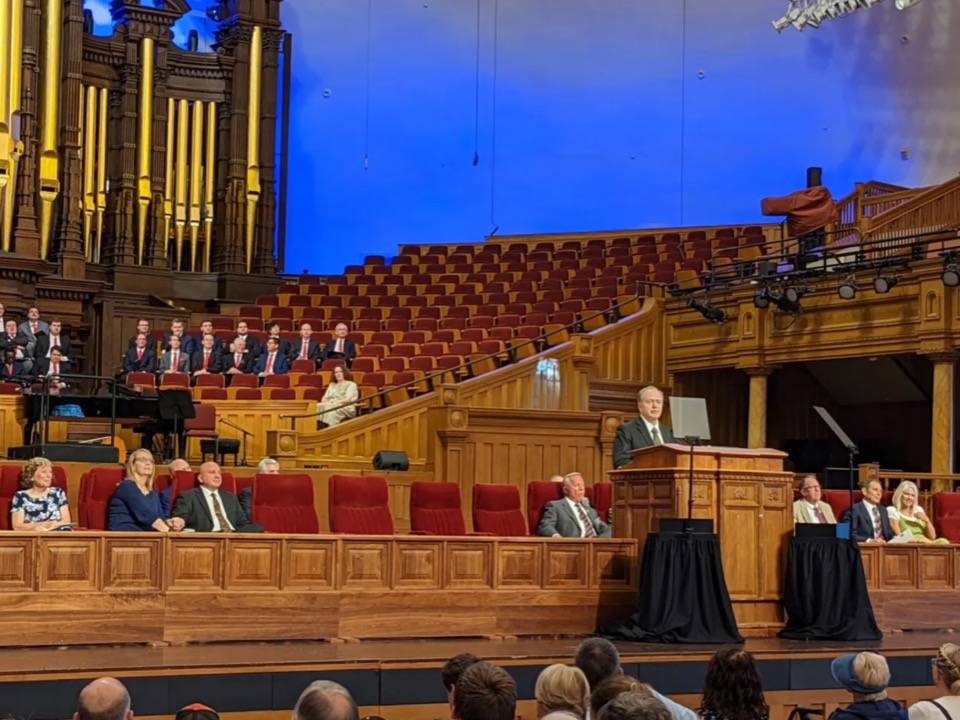
This story appears here courtesy of TheChurchNews.com. It is not for use by other media.
By Valerie Walton, Church News
As the demisemiseptcentennial — it’s a real word — of the pioneers’ entry into the Salt Lake Valley on July 24, 1847, is celebrated this year, many people are looking back at the inspiring accounts of faith and courage early Church members demonstrated in the face of immense trials and hardship 175 years ago.
Elder Lynn G. Robbins, General Authority Seventy, shared one such story from his own family history in his address during the Days of ’47 Sunrise Service held in the Salt Lake Tabernacle on Saturday, July 23.
He recounted the youthful spirit and spunk of his third great-grandmother Mary Ann Campbell Robbins, a member of the Milo Andrews Company, who made the journey west at age 94. Though she died in Wyoming, just 200 miles shy of the Salt Lake Valley, her story is “an inspiration of courage and fortitude for the family,” Elder Robbins said.
But when reflecting on the many stories of hardship and sacrifice these pioneers faced, many people today may ask, “Would I have been a pioneer if I had lived at that time?”

df004e1f01ff11ec86fceeeeac1ed7dc6dba4840.jpeg
Portrait of Elder Lynn G Robbins, 2021.2021 by Intellectual Reserve, Inc. All rights reserved.About 20 years ago, Elder Robbins posed this same question to then-Elder Henry B. Eyring of the Quorum of the Twelve Apostles while they flew with a few other general Church leaders to California to meet with 80 member families who had just lost their homes to devastating wildfires.
President Eyring, now the second counselor in the First Presidency, gave Elder Robbins an insightful and succinct answer: “If you are valiant today, you would have been valiant then. If you are valiant today, you would have been one of the pioneers.”
During his time as president of then-Ricks College a few decades before, President Eyring witnessed the aftermath of the Teton Dam collapse on June 5, 1976, which sent over 1 million cubic feet of water per second in a deluge that flooded several communities below the dam.
The crisis, he explained was a time of heroism — and cowardice. Many risked their lives to help others. Many knowingly abandoned those who cried out for their help. “A crisis doesn’t create one’s character; it reveals it,” President Eyring said.
“A crisis doesn’t make heroes and cowards,” Elder Robbins further explained. “The latent heroism or cowardice was already in their hearts just waiting to be unveiled by the crisis.”
Today, Church members face a far different kind of crisis than the pioneers of 1847 did. “It has been called a ‘faith crisis,’ and it is character revealing, just as President Eyring taught me so many years ago,” Elder Robbins said. Some do not survive a faith crisis and murmur against Church history and the prophets. However, the “overwhelming majority face the opposition with the same faith as our pioneers.”
How does one develop that type of character that will help them survive such a crisis with the faith of the pioneers?
The scriptures have many examples to learn from, including those who did not face crises with faith — for example, the Israelites fleeing from Egypt, Lot’s wife escaping the destruction of Sodom and Gomorrah, and Laman and Lemuel leaving Jerusalem with their father, Lehi.
One similarity the murmurers shared was a tendency to fixate on the past. The Israelites “longed for Egypt more than the promised land. … Similarly, Laman and Lemuel longed for Jerusalem.” Lot’s wife also looked back and became a pillar of salt.
It’s something the Savior warned against in Luke 9:62: “And Jesus said unto him, no man, having put his hand to the plough, and looking back, is fit for the kingdom of God.”
“We are to move forward with an eye single to the glory of God with faith in every footstep, like our pioneer ancestors,” Elder Robbins said.
Lehi’s family perhaps gives the greatest contrast of responses to facing a truly formidable crisis. The eldest sons, Laman and Lemuel, demonstrated their deep-seated murmuring and rebellious character, epitomizing Doctrine and Covenants 58:29: “But he that doeth not anything until he is commanded, and receiveth a commandment with a doubtful heart, and keepeth it with slothfulness, the same is damned.”
In contrast, Nephi courageously accepted the Lord’s will, Elder Robbins said. “His faithful and valiant nature quickly surfaced as he faced the same crisis with fortitude and resilience, and the crisis further strengthened his character. His response has become legendary and memorialized in scripture and song: ‘I will go; I will do the thing the Lord commands,’” (“Nephi’s Courage,” Children’s Songbook; see 1 Nephi 3:7).
These brothers faced the same hardships but came away having two entirely opposite experiences. Laman and Lemuel murmured about the afflictions they faced, while Nephi recognized the blessings they enjoyed.
“What we learn from these examples is the reality and truth that we are agents to act and not be acted upon, and we get to choose how we see the world,” Elder Robbins said. “We get to choose how we react to hardship and misfortune.”
Even in the early days of the Church, there was murmuring. While living in Kirtland, Ohio, in 1837, many Church members, even members of the Quorum of the Twelve Apostles, had become critical of the Prophet Joseph Smith and caught up in a dissenting spirit.

Elder Robbins quoted President David O. McKay, who taught that “those who complain and murmur against the leaders of the Church lose their faith. A testimony of the gospel is based on the Spirit. If we complain against the servants of the Lord, the heavens are offended, and the Spirit withdraws, and amen to the faith of that individual. … Murmuring against the priesthood or auxiliary leadership is one of the most potent poisons that can be found in the home of a Latter-day Saint” (Improvement Era, March 1969, p. 3).
Elder Robbins added, “From the several exodus accounts and crises from the scriptures we should learn how toxic it is to murmur and avoid murmuring like the plague that it is.”
The world has been emerging from another major crisis, the COVID-19 pandemic. Millions of lives have been lost worldwide and others continue to suffer the virus’s effects.
As with other crises, there were examples of heroism and cowardice, even amongst members of the Church. During 2020 and 2021, Church members donated more in service, time and monetary resources than ever before. “We also began to see an increase in murmuring in the Church at levels perhaps not seen since the days of Kirtland,” Elder Robbins said.
“The spirit of the Days of ’47 is not a spirit of murmuring but a spirit of ‘faith in every footstep.’ It is symbolic of those who survived their crisis and whose characters were forged in the furnace of affliction — those of great faith, sacrifice and enduring to the end. The crisis was the trial of their faith and it helped polish their characters.”
To face the crises of the future, remember both the uninspiring examples — that of Laman and Lemuel, the Israelites, or Lot’s wife — as well as the inspiring ones of Nephi, pioneer forebears, and especially Jesus Christ.
“The greatest crisis in the history of the world occurred in Gethesemane and Golgotha,” Elder Robbins said. “Though the Savior’s character had been manifested every day of His mortal ministry, it was majestically revealed through that crisis in His final hours. We are all eternally grateful that the Savior and Redeemer of the world did not shrink from drinking the bitter cup, nor shun the fight, when all eternity hung in the balance.”
The Salt Lake Pioneer Chapter of the Sons of Utah Pioneers, in partnership with the National Society of the Sons of Utah Pioneers, and The Days of ’47 Committee co-sponsored the annual devotional. Music was provided by the Salt Lake Valley Combined Institute Choir, with Rick Decker and Trina Garlick conducting, Linda Margetts at the organ and Evan Mendez at the piano; the Days of ’47 royalty — queen Caroline Johnson, first attendant and violinist Anna Johnson and second attendant Arielle Cline — also performed a musical number. The Mormon Battalion Association, led by Kevin Henson, conducted the posting of the colors and the Pledge of Allegiance.
Copyright 2022 Deseret News Publishing Company.
